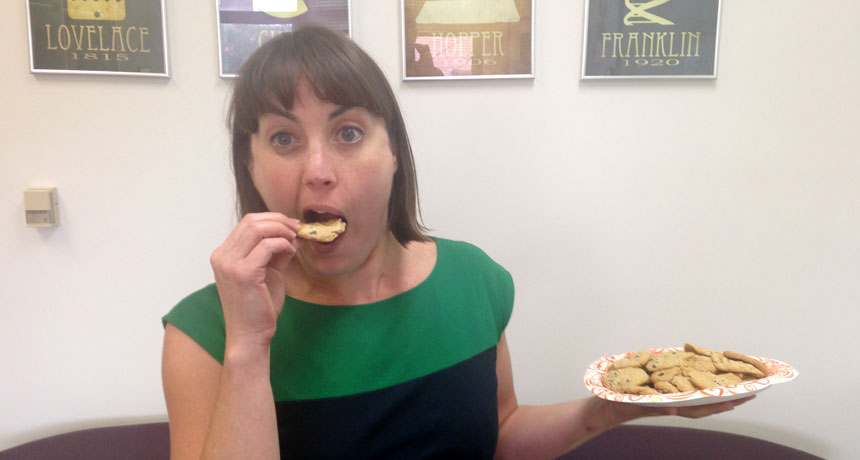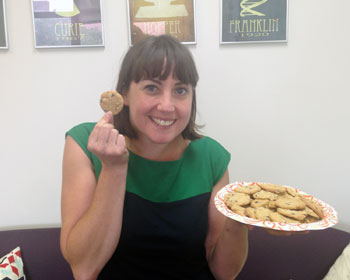Cookie Science 18: Eating it up
It’s the end of cookie science, but perhaps just the start of your next experiment

My experiments are finished, and my friend likes my cookies! But while I’m turning off the oven, your experiment might just be heating up.
K. Collette
After many hours in the kitchen, my project is done. I baked more than 500 cookies in the name of science. Over several months, I gathered more than 100 people to eat them. I ran statistics and later made posters to display my results. But the real test of my success would only come from one very special judge. That’s Natalie, the woman who inspired my experiments. And she’s just sent word that the chocolate-chip cookies that I shipped to her did just what I had hoped. They provided a tasty treat that she could enjoy. And that’s no small feat! Her body can’t tolerate the wheat flour in ordinary cookies.
So my project is done. But I hope this series of blog posts inspired you to take on some research — and to do it the right way.
As I noted in my early posts, Natalie has celiac disease. So her body rebels against gluten. That’s the protein in wheat that helps make cookies chewy.
Using science, I undertook to create a chocolate-chip cookie that wouldn’t make Natalie ill. I tested gluten-free flours and I added in ingredients that would put the chewiness back in my altered recipes. In the end, my research yielded a gluten-free cookie that was very close to a normal, wheat cookie.

Natalie says she especially appreciated their chewiness and that they did not leave a weird aftertaste. That’s something she’s encountered — and that has turned her off — in many commercial gluten-free products. Knowing how happy she was (and that she ate the whole plate of cookies) made my many, many, many hours of research worthwhile.
I am done baking cookies for a bit. But you are welcome to try to replicate my experiments for yourself! If baking isn’t your thing, don’t let that keep you from jumping into research. The steps behind Cookie Science are the steps that guide all scientists as they conduct experiments. All you need to start out is an idea.
Research often can look difficult and expensive. But it doesn’t have to be. Maybe you want to grow a better tomato, reduce car accidents or help native birds in your back yard. With some goal in mind, develop a hypothesis, something that you can test. Then, follow the steps in Cookie Science. Change only one variable at a time. Keep a good lab notebook. Make sure you calculate how many times you need to run your experiment. And then interpret your results carefully.
Cookie Science might be over. But if you’ve got an idea to test, your scientific experiment may be ready to begin.
Follow Eureka! Lab on Twitter
Power Words
(for more about Power Words, click here)
celiac disease (or coeliac disease in the United Kingdom) A disorder in which the immune system attacks the small intestine after it encounters foods containing gluten, a wheat protein compound. People with this disease suffer from stomach pain, constipation, diarrhea and a constant feeling of fatigue. They must avoid gluten-containing products like bread, cake and cookies.
gluten A pair of proteins — gliadin and glutenin — joined together and found in wheat, rye, spelt and barley. The bound proteins give bread, cake and cookie doughs their elasticity and chewiness. Some people may not be able to comfortably tolerate gluten, however, because of a gluten allergy or celiac disease.
hypothesis A proposed explanation for a phenomenon. In science, a hypothesis is an idea that hasn’t yet been rigorously tested. Once a hypothesis has been extensively tested and is generally accepted to be the accurate explanation for an observation, it becomes a scientific theory.
statistics The practice or science of collecting and analyzing numerical data in large quantities and interpreting their meaning. Much of this work involves reducing errors that might be attributable to random variation. A professional who works in this field is called a statistician.
variable (in mathematics) A letter used in a mathematical expression that may take on more than one different value. (in experiments) A factor that can be changed, especially one allowed to change in a scientific experiment. For instance, when measuring how much insecticide it might take to kill a fly, researchers might change the dose or the age at which the insect is exposed. Both the dose and age would be variables in this experiment.